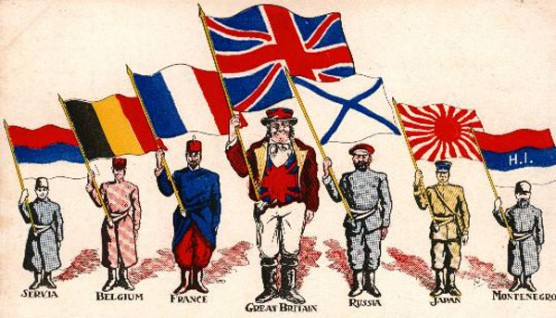Nationalism: Misunderstood and Misrepresented
December 5, 2016Ever since the carnage of WWII, there has been understandable aversion towards, even fear of, nationalism in Europe. Simultaneously, in the Western hemisphere, and especially the United States, the assimilation of largely European immigrants was continuing. But with no nations having truly been created in the correct and precise sense of the term “nation”—naturally, a lack of understanding of nationalism came to dominate political and social discourse.

Ever since the carnage of WWII, there has been understandable aversion towards, even fear of, nationalism in Europe.
This combination of fear and ignorance has created a very unhealthy brew. Sadly, on my end of the political spectrum, the left, there is a very pronounced antipathy towards nations and nationalism. What’s wrong with being proud of one’s Armenianness, Arabness, Creeness, Germanness, Tamilness, etc. The key is to not go overboard into chauvinism and denigration of others’ nationalism. There has been a decades-long effort to deny, dismiss, denigrate, disregard, destroy, and/or demonize nationalism. This effort has created dangerous societal conditions.
As a result, we have come to bandy about terms that are otherwise ridiculous. “Islamic nationalism” and more recently “white nationalism” are used with a straight face. How can the concept of nation (azg in Armenian) apply to a religion or race? If it wasn’t so misguided and destructive, this type of misnaming could just be dismissed as silly. We also see the use of euphemisms to describe what exists in real life: the terms “culture” or “people” or “ethnic group” have come into use when “nation” would have been more proper, while “nation” has become synonymous with “country” or “state” which are two very different concepts.
This process has gone so far that we encounter “observations” such as “Until quite recently, white Americans could easily see the nation as essentially an extension of their own ethnic group.” This was attributed to Eric Kaufmann, a professor of politics at Birkbeck University in London, in Amanda Taub’s Nov. 21 New York Times piece, “White Nationalism’ Explained.”
Well, no, emphatically, no. White Americans could see the nation as an extension of their “ethnic group” only to the extent that the assimilative process had led to millions of Irish, later northern European, still later eastern European, etc. immigrants and their descendants adopting the dominant Anglo-Germanic culture of the United States (I recall reading somewhere that at the time of the American Revolution, more people spoke German than English in the 13 colonies). But along the way, that dominant culture was being modified, too. The easiest way to observe this is through food. E.g., pizza and pasta are now ubiquitous and just as “American” as any dish eaten in the 13 colonies.
In scholarly circles, it’s fashionable to describe the concept of nation as something that was “invented” just a very few centuries ago. If that was true, then it would be very natural for us, humans, as the “inventors” to simply “uninvent” it or replace it with something else. I think that what happened a few centuries ago was the discovery or recognition of nations and their existence. Thus, nations are not some artificial, intellectual, political-organizational construct. Rather they are the product of human societal development. We disregard this truth at our own peril.
The misuse of “nation” and “nationalism” coupled with the confusion that has bred now allows for ridiculous explanations for social and political phenomenon. Most recently, this has happened with the Brexit vote, Trump’s apparent election, and the ongoing French presidential election. “Hate” and “racism” and antipathy towards multiculturalism are all somehow conflated and even equated to nationalism as driving forces of the people who voted in favor of Brexit, Trump, and Fillon (the recently selected conservative-party standard bearer for the upcoming French presidential elections). This is outright ridiculous. People are fed up with being abused by the political systems and elites in their countries and are voting against those. The fact that some of these disgusted voters may also be racists, etc. doesn’t make the political beneficiaries of their votes racist. In the same way, Obama doesn’t become an advocate of cop-killing just because some people who supported him may be advocating such an approach in response to the needless police killings of black citizens.
And, taking these one more notch towards the absurd is the budding concern that a Putin-loving axis of European leaders, all of the “nationalist” stripe, will take the continent in an illiberal direction. Also, gasp, they might even work with Putin regarding Syria, with Trump possibly joining in. Of course this would be horrible, right? Imagine the world cooperating to rid itself of the Daesh/ISIS plague!
What these analysts should be far more concerned about is the abuse of nationalism in Turkey. Erdogan’s cynical manipulation of Turks’ pride to whip up anti-Kurdish and generally anti-other sentiments is being overlooked. But, it is bearing fruit. Have you noticed how the number of anti-Armenian graffiti incidents in Turkey is one the rise?
When you see these analyses in various publications, write them and sternly recommend the pundits penning them get a better grip of reality!
Source: Armenian Weekly
Link: Nationalism: Misunderstood and Misrepresented